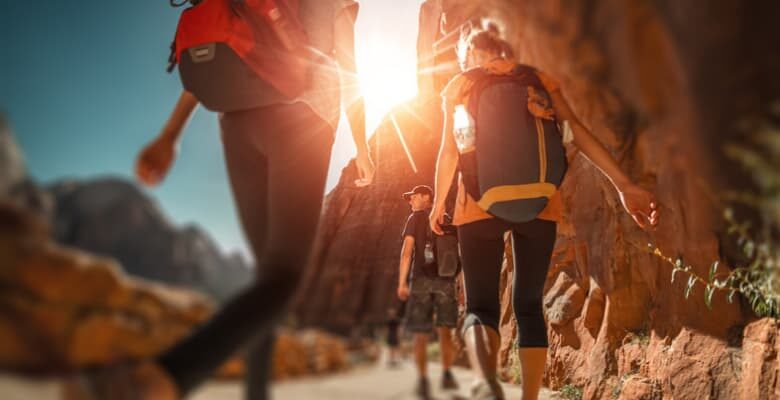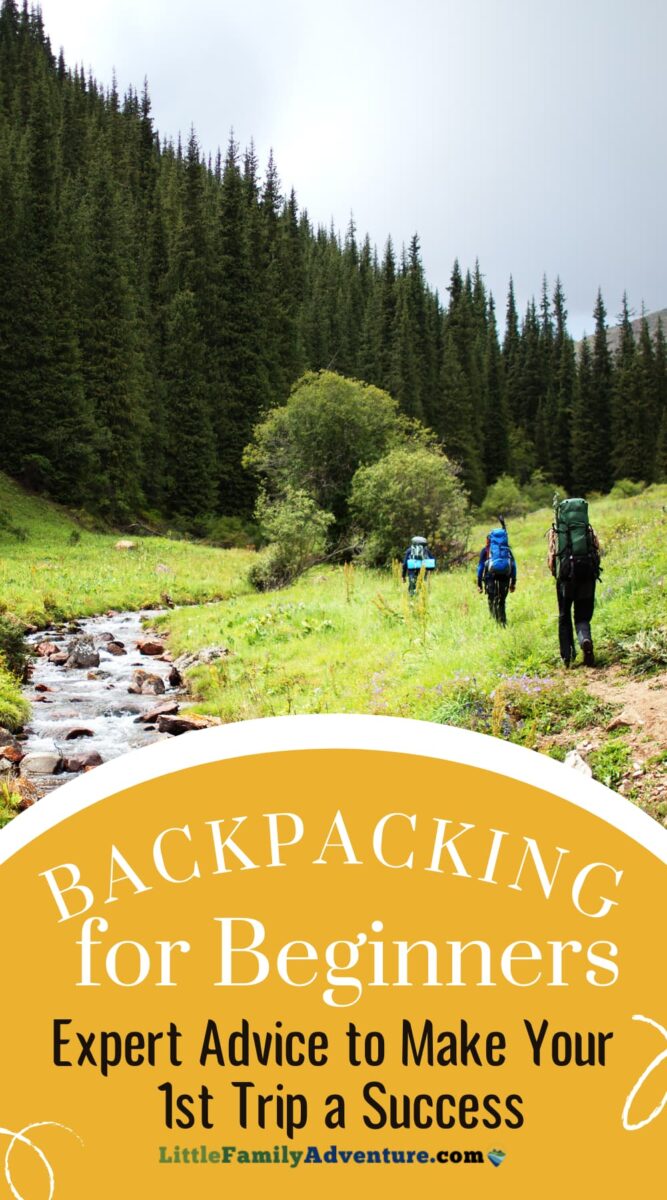Backpacking – You are starting to get excited about this new adventure that lies ahead. But before you go on any backcountry trip, take the advice of fellow outdoor adventurers. We asked other backpackers to share practical tips they wish they’d known before starting out. To make sure your first backpacking trip is a success, we share those tips here.
Packing up everything you need for a multi-day hike can be intimidating and overwhelming for beginners, especially if you don’t know what to expect. Take note of the tips and tricks that suit you best and add them to your own backpacking routine.
This article contains affiliate links. We earn from qualifying purchases.

16 Practical Tips For Your First Backpacking Trip
Listen to your body – If there is one thing I wish someone had told me before my first backpacking trip, it would be to LISTEN TO YOUR BODY. I didn’t learn this until after the first few hours of my hike and it could have not made a bigger difference in my comfort level.
Backpacking is physically demanding – you are carrying everything you will need on your back for 4-5 days. For beginners, look for a hike that is moderate rather than difficult so your pack can remain manageable. Get more advice here on how to perfect your hiking pace with strength exercises.
Take it easy – Take your time while backpacking in the wild. Hiking is a sport, and while you want to make it to your destination as soon as possible, rushing will only get you injured or lost. Plus it will take you places you have never been before, especially if it’s your first trip. Be prepared to see things that might be worth stopping for! If you are too focused on just getting to the campsite, you could miss them.
Research ahead of time – You should always do research your trip beforehand. That means reading about the trail and the destination, asking other adventurists about their experience, and of course, making sure that the trail is well-marked.
Start Close to Home – Until you are experienced, you should not venture too far from where you are staying. It’s best to choose easier hikes closer to home and build up your stamina.
Navigation – Bring a map and compass if you have to, especially when navigating in mountains or hard-to-read terrain. This is a must for beginners, as you never want to get lost.
Start slow – As beginning backpackers, it’s a good idea to start taking day trips and short overnights before heading into the backcountry for a longer trip. A good goal for a beginner backpacker/hiker is 5-6 miles per day. You can do this with friends or family to get used to your gear before you go out on your own.

Buddy System – Sometimes, it is better to go backpacking with someone else so that you will have company in case something happens. Two pairs of eyes are always better than one, right?
Pack it in, Pack it out – Never leave anything behind – One of the most important things about going backpacking is leaving no trace. What I mean is taking everything with you that you take down the trail with you. This means not only your own garbage but also other people’s garbage too! Try to encourage others to adhere to this rule as well.
Campfire – A campfire is a great way to spend the evenings, especially on your first backpacking trip. However, you should always be considerate of the people around you and never leave your fire unattended. Also, check with the park ranger about any specific rules for fires in that area.
Come Prepared – The old saying goes, “It is better to have it and not need it than to need it and not have it”. Bring the 15 backpacking essentials in case anything happens. This includes things like water purifiers, first aid kit, sunscreen, flashlights/headlamp, etc. Always test your equipment before going backpacking.
Be Weather Aware – Don’t forget your rain jacket! Even if the forecast doesn’t call for rain, it is always a good idea to bring one. You never know when things might change and you will be much more comfortable in wet conditions than in hot conditions. Before leaving on your trip, check the weather along the route. This should be a priority so you can pack accordingly.
Pack only what you need – First of all, leave the kitchen sink at home! You don’t need everything in your house to go backpacking. Only pack items that are essential for you and your trip. Try to include lightweight versions of those things as well if it’s not too extreme.
Bring Toilet Paper – A small amount of toilet paper is always better than not bringing any at all! You never know when you might need it, so just bring some in your backpack.
Bear Country – It’s important that you listen carefully to what people living in bear country tell you about where and how to hike safely. Most of these areas require hikers to carry bear spray, which you can learn how to use with the right training.

Practice, Practice, Practice – One last thing. Practice with all pieces of gear at home before taking them on the trail. When deciding what pieces of gear you’ll actually bring, opt for lightweight items that still allow you to remain comfortable. For example, instead of bringing a bulky camping chair that weighs several ounces, bring a lightweight tarp that will provide the same comfort under your rear end while remaining just as portable.
Ready, Set, Go! – Once you have all your things packed and ready to go, it’s time to go hiking! Make sure to take a deep breath, relax and enjoy the view. Don’t forget your camera; we’re making memories here! Now let’s go exploring!
I hope you found these backpacking tips for beginners helpful. Do you have any additional advice for someone getting ready for their hike multi-day trip? Share it in the comments below if you do.




Great tips! I remember my first backpacking trip. I didn’t listen to my body and overdid it. Now I always start with a moderate hike. How do you plan to apply these tips?